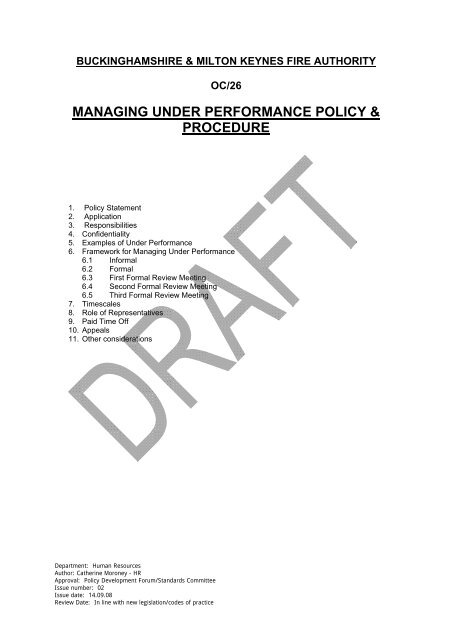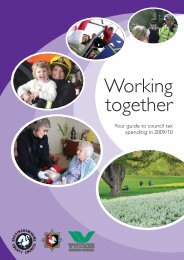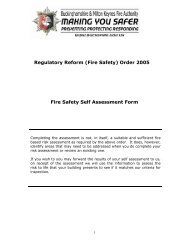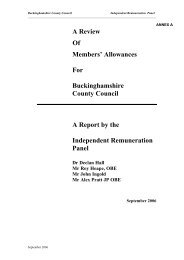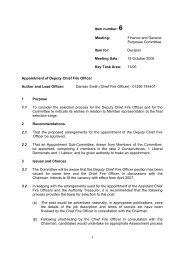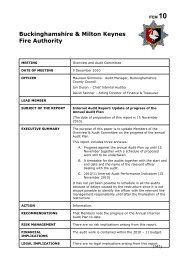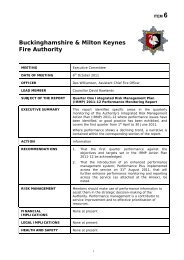Managing Underperformance Policy and Procedure
Managing Underperformance Policy and Procedure
Managing Underperformance Policy and Procedure
Create successful ePaper yourself
Turn your PDF publications into a flip-book with our unique Google optimized e-Paper software.
BUCKINGHAMSHIRE & MILTON KEYNES FIRE AUTHORITY<br />
OC/26<br />
MANAGING UNDER PERFORMANCE POLICY &<br />
PROCEDURE<br />
1. <strong>Policy</strong> Statement<br />
2. Application<br />
3. Responsibilities<br />
4. Confidentiality<br />
5. Examples of Under Performance<br />
6. Framework for <strong>Managing</strong> Under Performance<br />
6.1 Informal<br />
6.2 Formal<br />
6.3 First Formal Review Meeting<br />
6.4 Second Formal Review Meeting<br />
6.5 Third Formal Review Meeting<br />
7. Timescales<br />
8. Role of Representatives<br />
9. Paid Time Off<br />
10. Appeals<br />
11. Other considerations<br />
Department: Human Resources<br />
Author: Catherine Moroney - HR<br />
Approval: <strong>Policy</strong> Development Forum/St<strong>and</strong>ards Committee<br />
Issue number: 02<br />
Issue date: 14.09.08<br />
Review Date: In line with new legislation/codes of practice
RECORD HISTORY:<br />
1.0 Second Issue: in final draft format – not agreed<br />
2.0 Redefine informal <strong>and</strong> formal stages<br />
3.0 Numerous minor changes <strong>and</strong> major changes to procedure. Previous policy disciplined<br />
employees incapable of carrying out the role. New policy has review meetings <strong>and</strong><br />
recognises that capability may not be wilful.<br />
CONSULTATION:<br />
The following groups were consulted with in line with the process agreed at the <strong>Policy</strong> Development<br />
Forum<br />
- <strong>Policy</strong> Development Forum<br />
- Recognised Trade Unions: FBU, Unison, FOA<br />
- COFs/Human Resources<br />
- Employees via the Intranet <strong>and</strong> drop in surgeries<br />
- St<strong>and</strong>ards Committee<br />
COMMUNICATION:<br />
On approval of the policies <strong>and</strong> procedures will be accessible to all managers <strong>and</strong> employees via the<br />
intranet. Also available will be the following:<br />
- Relevant forms<br />
- Guidance for Managers<br />
- Relevant tables (i.e. redundancy, holiday, family friendly)<br />
It is expected that managers (from station manager up) will be required to attend a workshop on the<br />
re-launch of the policies in particular the disciplinary, health & sickness absence, managing<br />
underperformance, grievance <strong>and</strong> bullying <strong>and</strong> harassment.<br />
New Managers will attend the workshops as part of their induction.<br />
ORGANISATION<br />
Responsibilities:<br />
- Human Resources is responsible for reviewing the policies <strong>and</strong> procedures in line with<br />
changes to employment legislation, codes of practice.<br />
- Human Resources is responsible for carrying out People Impact Assessments on each<br />
policy.<br />
- Managers are responsible for ensuring that the policies <strong>and</strong> procedures are applied in a<br />
fair <strong>and</strong> consistent manner<br />
- Managers are responsible for communicating to employees the re-launch of the policies<br />
<strong>and</strong> procedures <strong>and</strong> supporting them to access them via the intranet<br />
- Employees are responsible for referring to policies <strong>and</strong> procedures on the intranet in the<br />
first instance<br />
Department: Human Resources<br />
Author: Catherine Moroney - HR<br />
Approval: <strong>Policy</strong> Development Forum/St<strong>and</strong>ards Committee<br />
Issue number: 02<br />
Issue date: 14.09.08<br />
Review Date: In line with new legislation/codes of practice
PLANNING<br />
All policies <strong>and</strong> procedures will be accessible via the intranet.<br />
Workshops will be available to all Managers <strong>and</strong> New Managers as part of the re-launch of the<br />
policies <strong>and</strong> procedures.<br />
This template, once approved, will replace the existing template which will be archived.<br />
MEASURING<br />
AUDITTING<br />
- The policy <strong>and</strong> procedures will be reviewed in line with changes to employment<br />
legislation/codes of practice.<br />
- Policies may be reviewed in line with case implementation <strong>and</strong> approx 6/12 months after<br />
their introduction to ensure they remain fit for purpose<br />
All approved policies will be stored as read only on the Intranet which only be updated by the Human<br />
Resources Department.<br />
REVIEWING<br />
All policies <strong>and</strong> procedures will be reviewed in line with any changes to employment legislation/codes<br />
of practice.<br />
Department: Human Resources<br />
Author: Catherine Moroney - HR<br />
Approval: <strong>Policy</strong> Development Forum/St<strong>and</strong>ards Committee<br />
Issue number: 02<br />
Issue date: 14.09.08<br />
Review Date: In line with new legislation/codes of practice
1. POLICY STATEMENT<br />
• The Authority recognises the need for a clear, fair <strong>and</strong> consistent policy <strong>and</strong> procedure<br />
for managing performance.<br />
• The organisation recognises the importance of individual performance <strong>and</strong> will endeavour to<br />
ensure that employees achieve <strong>and</strong> maintain a high st<strong>and</strong>ard of performance in their work by<br />
providing appropriate training <strong>and</strong> support to meet these st<strong>and</strong>ards. To this end the<br />
organisation will establish fair <strong>and</strong> achievable st<strong>and</strong>ards that are communicated clearly by line<br />
managers <strong>and</strong> performance is monitored.<br />
• It is further recognised that there are occasions when an individual’s performance may not<br />
meet the expected st<strong>and</strong>ards. In these circumstances the aim of the Authority is to support<br />
the employee to improve their performance within a timeframe to meet the needs of the<br />
Service <strong>and</strong> reasonable expectations on the employee. This will be achieved through the<br />
provision of appropriate resources; training, coaching <strong>and</strong> counselling to assist employees to<br />
develop in their role.<br />
• The <strong>Managing</strong> <strong>Underperformance</strong> procedure has been designed to ensure that concerns over<br />
performance are dealt with fairly <strong>and</strong> transparently <strong>and</strong> that steps are taken to establish the<br />
facts.<br />
• Where is it found that poor performance is within the employees control or wilful ie<br />
negligence, carelessness or unwillingness by the individual to co-operate in any training or<br />
development then the Disciplinary <strong>Procedure</strong> will be applied.<br />
• Where an employee is incapable of performing their duties due to long term ill health, then the<br />
‘Health & Sickness Absence’ policy applies.<br />
2. APPLICATION<br />
Scope<br />
• This policy applies to all employees directly employed by the Authority on permanent <strong>and</strong><br />
fixed term contracts of employment with the exception of the Chief Fire Officer for whom a<br />
separate procedure applies.<br />
• This policy <strong>and</strong> procedure will not apply to employees on probation period.<br />
• This policy does not apply to agency workers contracted to work through a temporary agency.<br />
3. RESPONSIBILITIES<br />
Employees are responsible for their performance.<br />
Line Managers are responsible for clearly communicating the st<strong>and</strong>ard required by the organisation to<br />
the employee. They are also responsible for providing, support <strong>and</strong> guidance to meet the required<br />
st<strong>and</strong>ard expected.<br />
Line Managers will provide the necessary training, development <strong>and</strong> coaching <strong>and</strong> provide a<br />
reasonable period of time for the employee to acquire relevant skills. Line Managers will regularly<br />
review performance matters with all employees against their TAPS/Performance Objectives.<br />
Department: Human Resources<br />
Author: Catherine Moroney - HR<br />
Approval: <strong>Policy</strong> Development Forum/St<strong>and</strong>ards Committee<br />
Issue number: 02<br />
Issue date: 14.09.08<br />
Review Date: In line with new legislation/codes of practice
4. CONFIDENTIALITY<br />
The Authority recognises the need so far as reasonably practicable to keep matters confidential<br />
through the <strong>Managing</strong> <strong>Underperformance</strong> procedure. Only those individuals directly involved in the<br />
matter which includes Managers, representatives <strong>and</strong> Human Resources will be advised of the details<br />
on a ‘need to know’ basis.<br />
5. EXAMPLES OF UNDER PERFORMANCE<br />
For a variety of reasons, employees who are conscientious, hard working, willing to improve <strong>and</strong> who<br />
have undertaken appropriate training may nevertheless be unable to fulfil the requirements of their<br />
role. This situation can arise, for example, where an individual has been recruited into a job for which<br />
they were unsuitable or it can arise when the nature of the role, technology or the complexity of the<br />
job, evolve over a period time. This can result in a mis-match between the job <strong>and</strong> the individual’s<br />
capability to perform it. The employee will be advised of what is expected <strong>and</strong>, how their performance<br />
will be measured.<br />
If performance levels deteriorate the watch manager or equivalent, or more senior depending on the<br />
employee’s status in the organisation, may refer to role descriptions/job descriptions, st<strong>and</strong>ard<br />
operating procedures, <strong>and</strong> national occupational st<strong>and</strong>ards. This is not an exhaustive list but any<br />
measures that are used will be set objectively <strong>and</strong> based on role maps <strong>and</strong> job descriptions.<br />
The manager will also have a discussion with the employee to underst<strong>and</strong> the reason for the poor<br />
performance, <strong>and</strong> offer help <strong>and</strong> support. If the employee’s performance continues to deteriorate the<br />
<strong>Managing</strong> under Performance policy will be invoked.<br />
In normal circumstances sanctions would be applied in sequence, however in serious cases the<br />
organisation reserves the right to start the procedure at any stage with the proviso that the sanction of<br />
dismissal/redeployment would not be applied unless there has been a second formal stage.<br />
6. FRAMEWORK FOR MANAGING UNDER PERFORMANCE<br />
6.1 INFORMAL<br />
Prior to invoking the formal procedure, managers should have discussed any performance issues with<br />
the employee <strong>and</strong> attempted to resolve them informally through the use of counselling, coaching<br />
<strong>and</strong>/or training as appropriate. Such informal discussions may be held with a view to (for example):<br />
o Clarify the required st<strong>and</strong>ards<br />
o Indentifying areas of concern<br />
o Establishing the likely causes of poor performance <strong>and</strong> identifying any training needs<br />
o Setting targets for improvement <strong>and</strong>/or<br />
o Agreeing a timescale for review<br />
Where poor performance is highlighted it is important that the employee is given specific examples to<br />
demonstrate where performance has fallen below agreed st<strong>and</strong>ards <strong>and</strong> what needs to be done by<br />
the individual to improve the position is clearly explained.<br />
The discussion should highlight what training/coaching/counselling/other measures will be provided in<br />
order to achieve the required level of performance. The agreed actions, support, <strong>and</strong> timescales<br />
should be clearly documented in an action plan <strong>and</strong> provided to the employee.<br />
Managers should recognise that there may be some external factors affecting the employee’s<br />
performance although these may not always be apparent. It is important that the employee brings<br />
these to the manager’s attention. Employees should be assured that support <strong>and</strong> consideration will<br />
be given to those who inform their manager about personal domestic, <strong>and</strong>/or health difficulties that<br />
are affecting their performance at work.<br />
Details of the discussion should be held as a file note <strong>and</strong> a copy provide to the employee.<br />
Department: Human Resources<br />
Author: Catherine Moroney - HR<br />
Approval: <strong>Policy</strong> Development Forum/St<strong>and</strong>ards Committee<br />
Issue number: 02<br />
Issue date: 14.09.08<br />
Review Date: In line with new legislation/codes of practice
6.2 FORMAL<br />
General Principles<br />
• The <strong>Managing</strong> <strong>Underperformance</strong> framework consists of 3 formal stages.<br />
• In the vast majority of cases, an informal meeting is all that is needed, but when the levels of<br />
underperformance continue <strong>and</strong> where an action plan is not being met, a more formal<br />
meeting should be held to discuss the employees performance.<br />
• At this stage a decision will be made as to whether the <strong>Managing</strong> <strong>Underperformance</strong><br />
<strong>Procedure</strong> should be followed, or whether it is more appropriate to invoke the disciplinary<br />
procedure if the underperformance issue is deemed ‘wilful’. However, the aim of both<br />
procedures is to improve individual performance.<br />
• At each stage there should be a review of the action plan <strong>and</strong> any coaching or training<br />
provided <strong>and</strong> a discussion about why this has not resulted in a sufficient improvement. Prior<br />
to being asked to attend a meeting under the formal procedure, an employee will be provided<br />
with a letter setting out the nature of performance shortfall <strong>and</strong> providing relevant examples<br />
which demonstrate why the line manager is contemplating action under the formal procedure.<br />
Employees should be advised at each stage that should their performance not improve that it<br />
may lead to their dismissal from the organisation. The meeting may be adjourned if either<br />
party needs to gather any further information or give consider to matters discussed during the<br />
meeting.<br />
• The employee should be provided with 7 working days notice in writing of the meeting <strong>and</strong><br />
they will have the right to have a union representative or work colleague present at the<br />
meeting.<br />
• The outcomes from the formal stages should be confirmed in writing to the employee within 7<br />
working days of the meeting. Importantly this should set out the expected timescales for<br />
improvement, together with an indication of what the next step will be if not achieved along<br />
with the employee’s right of appeal.<br />
• If the managing under performance procedure is used any payments for additional<br />
performance such as CPD (for operational employees) will be suspended until the<br />
performance has improved. When the underperformance has been resolved the CPD may be<br />
re-instated following a new application but not backdated. Increments may be withheld for<br />
support employees until the performance has been resolved. When the underperformance is<br />
resolved the increment will be awarded but only from the date the underperformance was<br />
resolved. It will not be back-dated.<br />
• If conduct <strong>and</strong> performance problems begin to occur simultaneously, each issue will be dealt<br />
with under the respective policy by the line manager. The employee will have the right to<br />
representation.<br />
6.3 FIRST FORMAL REVIEW MEETING<br />
If the employee’s performance improves they should be advised <strong>and</strong> any further action suspended.<br />
However, should the informal stage not lead to the required improvement, the line Manager (the<br />
lowest level should be a Station manager or equivalent or more senior depending on the employee’s<br />
status in the organisation will advise the employee that they are required to a formal meeting under<br />
the procedure.<br />
The employee will be provided with 7 working days notice in writing. Employees have the right to<br />
have a union representative or work colleague accompany them at the meeting. If an employee’s<br />
Department: Human Resources<br />
Author: Catherine Moroney - HR<br />
Approval: <strong>Policy</strong> Development Forum/St<strong>and</strong>ards Committee<br />
Issue number: 02<br />
Issue date: 14.09.08<br />
Review Date: In line with new legislation/codes of practice
epresentative or work colleague cannot attend a proposed date the employee can suggest another date,<br />
so long as it is reasonable <strong>and</strong> is not more than 7 working days after the original date.<br />
The line manager will conduct the meeting in an open, helpful <strong>and</strong> supportive way. If the employee<br />
cannot satisfactorily explain why they are not performing, they will receive a letter confirming the<br />
meeting under the first formal stage <strong>and</strong> an action plan will be updated/created. A timescale for<br />
improvement along with review periods agreed.<br />
The employee should be advised that if they do not complete the action plan satisfactorily or their<br />
performance becomes worse within a 6 month period, a formal stage two under performance meeting<br />
will be arranged.<br />
The line manager is responsible for informing HR if entitlement to CPD or increments are to be<br />
withdrawn.<br />
The outcome of the meeting will be confirmed within 7 working days of the meeting <strong>and</strong> should<br />
include confirmation of the issue, any required remedial action <strong>and</strong> the timescale for improvement, It<br />
should also include confirmation that the employee has the right to appeal within 7 working days of<br />
receipt of the letter.<br />
A copy of the letter with the action plan will be provided to HR by the manager <strong>and</strong> this will be kept on<br />
the employees HR file for 6 months.<br />
6.4 SECOND FORMAL REVIEW MEETING<br />
If the employee’s performance improves they should be advised <strong>and</strong> any further action suspended.<br />
However, if the employee’s performance does not improve or continues to get worse the employee<br />
will be asked to attend a second formal stage meeting.<br />
The meeting will be conducted by the Group Manager or equivalent or more senior depending on the<br />
employee’s status in the organisation. The employee will receive 10 days notice of the meeting.<br />
The same process should be followed as in the first formal stage process.<br />
The employee should be advised that if they do not complete the action plan satisfactorily or their<br />
performance becomes worse within a 6 month period, a formal stage three under performance<br />
meeting will be arranged.<br />
The line manager is responsible for informing Human Resources if entitlement to CPD or increments<br />
are to be withdrawn.<br />
The outcome of the meeting will be confirmed within 7 working days of the meeting <strong>and</strong> should<br />
include confirmation of the issue, any required remedial action <strong>and</strong> the timescale for improvement,<br />
along with agreed review periods. It should also include confirmation that the employee has the right<br />
to appeal within 7 working days of receipt of the letter.<br />
A copy of the letter with the action plan will be provided to Human Resources by the manager <strong>and</strong> this<br />
will be kept on the employee’s Human Resource file for 12 months.<br />
6.5 THIRD/FINAL FORMAL REVIEW MEETING<br />
If the employee’s performance improves they should be advised <strong>and</strong> any further action suspended.<br />
However, if the employee does not successfully complete the action plan or their performance fails to<br />
improve or gets worse, the employee will be asked to attend a third <strong>and</strong> final under performance<br />
meeting.<br />
Department: Human Resources<br />
Author: Catherine Moroney - HR<br />
Approval: <strong>Policy</strong> Development Forum/St<strong>and</strong>ards Committee<br />
Issue number: 02<br />
Issue date: 14.09.08<br />
Review Date: In line with new legislation/codes of practice
The meeting will be conducted by an area manager or equivalent or more senior depending on the<br />
employee’s status in the organisation. The employee will receive 21 working days notice of the<br />
meeting.<br />
Employees have the right to have a union representative or work colleague accompany them at the<br />
meeting. If an employee’s representative or work colleague cannot attend a proposed date the<br />
employee can suggest another date, so long as it is reasonable <strong>and</strong> is not more than 7 working days<br />
after the original date.<br />
The manager will conduct the meeting in an open, helpful <strong>and</strong> supportive way. The employee should<br />
be advised of the serious nature of the meeting <strong>and</strong> that it may result in one of the following<br />
a) them being demoted with limited pay protection<br />
b) dismissed from the organisation, or<br />
c) have an extension to the under-performance action plan provided the Manager feels that you<br />
are in a position to improve to an acceptable level.<br />
If the employee is a senior member of staff, the elected members of the Fire Authority may be<br />
required to take part in initial underperformance hearings (in the case of the CFO) or in later stages<br />
(in the case of other senior officers) if all levels of Principal Officer have been used in the<br />
management of the individual’s underperformance. In such circumstances, the Head Of Human<br />
Resources, or more senior officer if necessary, will refer the matter to the Clerk to the Fire Authority.<br />
The Clerk, in consultation with the Chairman of the Executive Committee, will arrange for three<br />
members of the Committee to form a panel, to hear the case in accordance with the sections above<br />
as appropriate.<br />
Where dismissal is contemplated, every effort will be made to try <strong>and</strong> find a suitable role for the<br />
employee although this may include a reduction in grade with limited pay protection. This is not a<br />
guarantee of alternative employment, but a commitment by the organisation to avoid dismissal of staff<br />
where this is at all possible.<br />
The manager who either dismisses or re-deploys the employee will be responsible for informing HR of<br />
any changes.<br />
The outcome of the meeting will be confirmed within 7 working days of the meeting <strong>and</strong> should<br />
include confirmation that the employee has the right to appeal within 7 working days of receipt of the<br />
letter.<br />
7. TIMESCALES<br />
It is important any under-performance issue is resolved as quickly as possible. Whenever possible,<br />
this should be done at the Informal Stage <strong>and</strong> it is the expectation that the overwhelming majority of<br />
cases will be dealt with at this level.<br />
Under-performance stages will last for the following periods of time:<br />
Informal<br />
First Formal - 6 months<br />
Second Formal - 12 months<br />
Third Formal Stage redeployed staff may apply for promotion once they demonstrate 6 months<br />
competence in their new role<br />
In cases where a pattern of underperformance emerges such as performance levels being met <strong>and</strong><br />
then deteriorating again within 12 months of achieving performance this may be regarded as<br />
misconduct <strong>and</strong> the disciplinary procedure may be applied.<br />
Should an employee’s performance deteriorate within 12 months of the completion of an action plan<br />
Department: Human Resources<br />
Author: Catherine Moroney - HR<br />
Approval: <strong>Policy</strong> Development Forum/St<strong>and</strong>ards Committee<br />
Issue number: 02<br />
Issue date: 14.09.08<br />
Review Date: In line with new legislation/codes of practice
they will re-enter the managing underperformance procedure at the level of the last stage. This will<br />
apply at any stage of the procedure.<br />
Any period of absence from work for more than four consecutive weeks will not be included in the<br />
underperformance stages. In these situations, under performance stages will stop during the<br />
absence <strong>and</strong> start again when the employee returns to work with the end date of the stage increased<br />
to reflect the time that the employee has spent away. Managers should advise HR of this in writing.<br />
They must also inform the employee in writing.<br />
At the end of the under performance period, performance notes will be disregarded but copies of the<br />
relevant documentation will be retained on file in the HR Department.<br />
Whilst employees may apply for CPD during the formal stage of the procedure managers should take<br />
the stage into account when considering whether the evidence in the application has merit?.<br />
Managers/employees should retain notes of each action plan review. This procedure does not<br />
prevent both the employee <strong>and</strong> the manager sharing notes. It must be remembered by all parties<br />
that the underlying principle of this procedure is to improve performance.<br />
8. ROLE OF REPRESENTATIVES<br />
Employees may be accompanied by a union representative or a work colleague at an informal or<br />
formal stage of the underperformance meeting.<br />
The role of the representative is to confer with the employee during the meeting/hearing <strong>and</strong><br />
participate as fully as possible in the meeting/hearing, The employee can nominate that person to<br />
speak on their behalf although the employee will be required to answer questions put to them directly<br />
by the Manager chairing the meeting. Employees should arrange for their representative to attend.<br />
Managers have the right to proceed in the employee’s absence if the employee is unable to attend the<br />
re-arranged meeting at any stage. If the employee cannot attend the employee may request their<br />
representative to attend on their behalf.<br />
The Authority recommends that the employee belongs to a recognised Trade Union or an<br />
independent Trade union, as Trade Union Officials are trained in employment matters.<br />
9. PAID TIME OFF<br />
Employees who may be subject to this procedure they are entitled to time off with pay to prepare for<br />
the meeting.<br />
Trade Union Representatives employed by the organisation are entitled to paid time off to prepare for<br />
a meeting <strong>and</strong> to attend any meeting held under this procedure. The amount of time off required will<br />
vary upon the complexity of the case but it is assumed that it will be reasonable <strong>and</strong> not excessive.<br />
Managers should not unreasonably deny requests for additional time off, but the employee <strong>and</strong> their<br />
Trade Union Representative are asked to be reasonable with their requests<br />
The employee must advise the person who is chairing the meeting who will be attending as their<br />
representative at least one day beforeh<strong>and</strong><br />
The employee’s representative is there to support them. The employee may have reasonable time to<br />
talk with them in private <strong>and</strong> they can ask questions on their behalf at the Formal Stages of the<br />
procedure. Within reason they may also ask questions at the Informal Stage although the<br />
organisation must point out the difference between accompaniment <strong>and</strong> representation at the Informal<br />
Stage.<br />
Department: Human Resources<br />
Author: Catherine Moroney - HR<br />
Approval: <strong>Policy</strong> Development Forum/St<strong>and</strong>ards Committee<br />
Issue number: 02<br />
Issue date: 14.09.08<br />
Review Date: In line with new legislation/codes of practice
10. APPEALS<br />
Appeals should be dealt with speedily <strong>and</strong> should not be unduly protracted although this should not<br />
prejudice the thoroughness of any investigation.<br />
If an employee disagrees with a decision made at a formal stage of the <strong>Managing</strong> Under-Performance<br />
<strong>Policy</strong>, then they must write <strong>and</strong> ask for this review within 7 days of the outcome of the meeting. This<br />
must be made to the Area Manager, HR, setting out the grounds for their appeal The following<br />
Managers will hear the appeal case:<br />
Informal Stage<br />
First formal stage<br />
Second formal stage<br />
Third Formal stage<br />
No right of appeal<br />
Manager above that that carried out the 1 st formal meeting<br />
Manager above that that carried out the 2 nd formal meeting<br />
Director of the employee<br />
The above appeal managers may be more senior depending on the status of the employee.<br />
If an ‘appeal’ manager has had some previous involvement in the case then the Head of Human<br />
Resources in consultation with the relevant Director, allocate a different Manager to hear any appeal.<br />
This procedure would apply at any stage if it was felt that due to the complexity of the case or the<br />
involvement of the manager that this would be necessary to ensure a fair <strong>and</strong> equitable hearing.<br />
Should the original under performance sanction be applied by the CFO, then the appeal would be to a<br />
panel of elected Members of the Fire Authority. In such circumstances, the Head of Human<br />
Resources, or more senior officer if necessary, will refer the matter to the Clerk to the Fire Authority.<br />
The Clerk, in consultation with the Chairman of the Executive Committee, will arrange for three<br />
members of the Committee to form a panel, to hear the case in accordance with the sections above.<br />
Should the original under performance sanction be applied by elected members of the Executive<br />
Committee, the appeal would be to the full Fire Authority. In such circumstances the Clerk, in<br />
consultation with the Chairman of the Fire Authority, will arrange for three members of the Authority to<br />
form an appeal panel. The three members must not have had previous formal involvement in the<br />
case.<br />
Appeal at Formal Stage 1 &2<br />
The appeal hearing will be conducted by the next manager above that that conducted the formal<br />
under performance meeting.<br />
The employee should be provided with 7 working day’s notice of the appeal hearing from HR on<br />
behalf of the respective appeal manager. Details of the hearing, reason for appeal <strong>and</strong> representation<br />
rights will also be confirmed in writing.<br />
Employees have the right to a union representative or work colleague accompany them at an<br />
appeal hearing. If an employee’s representative or colleague cannot attend a proposed date the<br />
employee can suggest another date, so long as it is reasonable <strong>and</strong> is not more than 7 working days<br />
after the original date.<br />
Both parties will provide any evidence that they wish to refer to, to HR for circulation at least three<br />
days prior to the hearing.<br />
Both parties will outline their case <strong>and</strong> questions may be asked by both parties, <strong>and</strong> the appeal<br />
manager. At the end of the meeting, the manager will adjourn to consider his/her decision. The<br />
following options will be considered.<br />
o<br />
o<br />
o<br />
Reject the appeal<br />
Amend the original decision by imposing a lower sanction<br />
Uphold the appeal <strong>and</strong> withdraw the original decision<br />
Department: Human Resources<br />
Author: Catherine Moroney - HR<br />
Approval: <strong>Policy</strong> Development Forum/St<strong>and</strong>ards Committee<br />
Issue number: 02<br />
Issue date: 14.09.08<br />
Review Date: In line with new legislation/codes of practice
The employee will receive the outcome of the appeal meeting within 7 working days of the appeal<br />
meeting...<br />
The decision of the appeal is final.<br />
Appeal against dismissal<br />
The appeal hearing will be conducted by the director of the employee.<br />
The employee should be provided with 7 working day’s notice of the hearing from HR on behalf of the<br />
director. Details of the hearing, reason for appeal <strong>and</strong> representation rights will also be confirmed in<br />
writing.<br />
Employees have the right to a union representative or work colleague accompany them at an<br />
appeal hearing. If an employee’s representative or colleague cannot attend a proposed date the<br />
employee can suggest another date, so long as it is reasonable <strong>and</strong> is not more than 7 working days<br />
after the original date.<br />
Both parties will provide any evidence that they wish to refer to, to HR for circulation at least three<br />
days prior to the hearing.<br />
Both parties will outline their case <strong>and</strong> questions may be asked by both parties, <strong>and</strong> the appeal<br />
manager. At the end of the meeting, the director will adjourn to consider his/her decision. The<br />
following options will be considered.<br />
• Dismiss the appeal<br />
• Amend the original decision by imposing a lower sanction, in which case the employee will be<br />
reinstated as though they had not left the service i.e. without a break in service<br />
• Uphold the appeal <strong>and</strong> withdraw the original decision, in which case the employee will be<br />
reinstated as though they had not left the service i.e. without a break in service.<br />
The employee will receive the outcome of the appeal meeting within 7 working days of the appeal<br />
meeting.<br />
The decision of the appeal is final.<br />
11. OTHER CONSIDERATIONS<br />
Should the original sanction that is the subject of the appeal have been applied by the CFO, then the<br />
appeal would be to a panel of elected Members of the Fire Authority. In such circumstances, the Head<br />
of Human Resources or more senior officer if necessary, will refer the matter to the Clerk to the Fire<br />
Authority. The Clerk, in consultation with the Chairman of the Executive Committee, will arrange for<br />
three members of the Committee to form a panel, to hear the case in accordance with the sections<br />
above.<br />
In the event that the original underperformance sanction had been applied by elected members of the<br />
Executive Committee, the appeal would be to the full Fire Authority. In such circumstances the Clerk,<br />
in consultation with the Chairman of the Fire Authority, will arrange for three members of the Authority<br />
to form an appeal panel. The three members must not have had previous formal involvement in the<br />
case.<br />
In the course of a ‘managing under-performance’ process, an employee might raise a grievance that<br />
is related to the case. If this happens, the manager should consider suspending the managing underperformance<br />
procedure for a short period while the grievance is dealt with. Depending on the nature<br />
of the grievance, the manager may need to consider bringing in another manager to deal with the<br />
managing under-performance process.<br />
Managers are responsible for completing all administration <strong>and</strong> paperwork at Formal Stages 1, 2 <strong>and</strong><br />
3 of the <strong>Procedure</strong>. Copies of the relevant paperwork should be sent to HR. It is also important if the<br />
Department: Human Resources<br />
Author: Catherine Moroney - HR<br />
Approval: <strong>Policy</strong> Development Forum/St<strong>and</strong>ards Committee<br />
Issue number: 02<br />
Issue date: 14.09.08<br />
Review Date: In line with new legislation/codes of practice
legal requirements of the Data Protection Act are to be met, <strong>and</strong> that references given are accurate<br />
<strong>and</strong> the principle of ‘not kept longer than necessary’ is adhered to.<br />
Department: Human Resources<br />
Author: Catherine Moroney - HR<br />
Approval: <strong>Policy</strong> Development Forum/St<strong>and</strong>ards Committee<br />
Issue number: 02<br />
Issue date: 14.09.08<br />
Review Date: In line with new legislation/codes of practice


